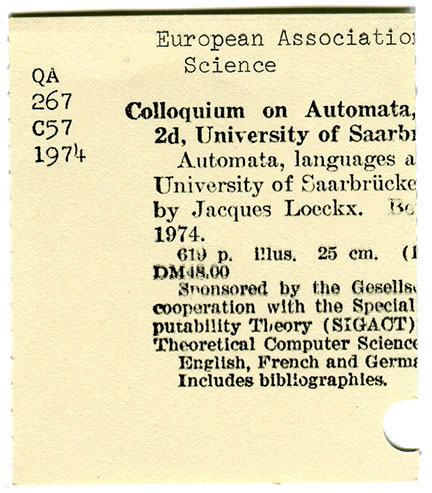 |
||
University of Arizona Main Library Card catalog cards, long the repository of generations of librarians' collected knowledge, have been cut into halves and quarters and are offered now as scrap paper on which students might write call numbers down, assuming they write down call numbers or anything else. It doesn't make me sad, even if much of this knowledge—idiosyncratic, local, and accrued, the function of several generations of catalogers' brains, is now subsumed by digital, standardized across the discipline, and in some cases lost entirely. That's how progress works: not all of what we had before is carried forward. Double Fold, Nicholson Baker's broadside against digitization of newspapers, points out—correctly, as it turns out—that in our zeal for scanning and photographing and pulping newspapers and other texts, often the original is discarded in part or in whole, and then what if the image file is corrupted? (Ask anyone who's lost a hard drive to a virus or to malfunction what that's like.) If we don't have the original what are we to do? Maybe the best we'll have to offer is the gaps we own in reconstructing the partly lost poems of the Greeks. Still, few of us want to go back to a pre-search world in which we do not have such easy access to all these databases and all this (apparent) knowledge. Secrets of the Super Searchers, a 1996 volume of interviews with professional searchers and researchers, in which they reveal their preferred databases and the way they fell in love with data, includes this little riff from Super Searcher Barbara Quint:
There is magic and an expertise in searching deeply, surely. You may know I own a card catalog, discarded in 2004 by Western Michigan University Library. Just two days ago the University of Arizona listed what is possibly their last card catalog for sale via their surplus auctions. These catalogs are glorious; they also weigh a great deal. Mine is mostly ornamental since the drawers are ill-suited to anything I have enough of to require that degree of taxonomy (if I still kept all my cassette tapes it would be ideal for this), but I've put a bid in on this second catalog. I don't know what I would do with it but I am compelled to acquire it if I can. I have the space. I live in Arizona where there is space and light and heat. Even if it's impractical I do desire it yes. Maybe I'll fill it with my collection of gleaned and halved cards and start building my database from scratch. This card invites us to investigate the 1974 Colloquium on Automata. 1974 was only the second year of the colloquium. I imagine an alternative future with a steam-powered automaton with thousands of clicking, whirring parts articulating an outstretched finger (or digit anyhow) to a row of cards, riffling its index pointer through the records (note the pleasing similarity of row of cards and records), like the needle looking for a record groove, searching for this card to find evidence of its manufacture or its invention, its issue at least, it traced its history back to this very conference, only to find it gone, a missing record, a link disposed of to offer undergraduates scrap paper. Camera slides back to reveal this scene is one of hundreds, thousands even, machines huffing puffs of steam and making their way through shelves of card catalog cards in buildings devoted to the storage of these things, all the humans having disappeared years ago thanks to our well-documented self-destructive urges (it only took an invasion, a little jump across the border to annex, say, Crimea, to trigger a nuclear holocaust, and all our knowledge structures disappeared like that), and having exhausted the information committed to digital databases these things collectively (or maybe individually, maybe this particular automaton's name's Jon or Sean or something meant to reassure a human, when that mattered, what we thought of machines, how we made them to reassure ourselves of their intentions) turned to the big and sprawling brain of the world before (all these cards and this much information must have been a brain, they reasoned, in the age before computers), these cards, for answers, and found something flawed and charming and idiosyncratic there, and perhaps, if they were programmed to simulate or show or actually enact emotion, perhaps they would have cried, or just shook their prehensile claws a bit to indicate a fail and continued on their search. |
||
